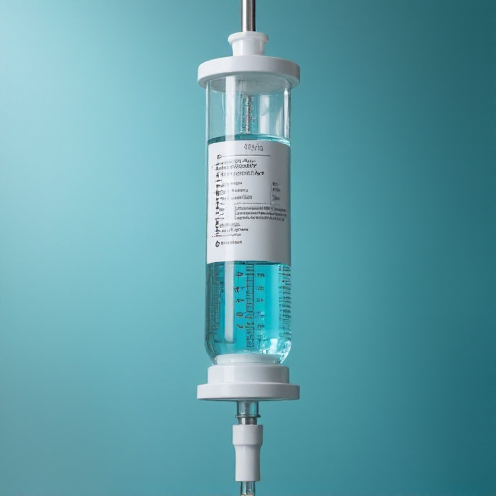Profol 1% Infusion
Product Info
| Prescription required | Yes |
| Marketer | Claris Lifesciences Ltd |
| Active Ingredient | Propofol (1%) |
| Storage | Store below 30°C |
| Chemical Class | Hypnotic alkylphenol derivative |
| Habit Forming | No |
| Therapeutic Class | PAIN ANALGESICS |
| Action Class | General anaesthetic agents |
| User Rating | 4.7 |
| User Reviews | 672 |
FAQ
Profol 1% Infusion Reviews
Profol 1% is a general anesthetic. It is used in major surgical procedures. It allows the procedures to be carried out without pain and distress. This injection is used in a hospital setting only.
Profol 1% causes loss of consciousness which is reversible. It is administered under the supervision of a doctor or a nurse. U=You should not self-administer this medicine at home.
The most common side effects include headache, vomiting, and nausea. This Profol 1% is safe to use in pregnancy, breastfeeding mothers, patients of liver and kidney disease. Inform your doctor if you are on any medications or have any known allergy to this medicine before the start of the procedure.
It is not advised to consume alcohol after you have been administered. Driving should not be done as this medicine may cause sleepiness and may impair your ability to think or react. It is also advised not to operate machinery because of these effects.
Profol 1% causes loss of consciousness which is reversible. It is administered under the supervision of a doctor or a nurse. U=You should not self-administer this medicine at home.
The most common side effects include headache, vomiting, and nausea. This Profol 1% is safe to use in pregnancy, breastfeeding mothers, patients of liver and kidney disease. Inform your doctor if you are on any medications or have any known allergy to this medicine before the start of the procedure.
It is not advised to consume alcohol after you have been administered. Driving should not be done as this medicine may cause sleepiness and may impair your ability to think or react. It is also advised not to operate machinery because of these effects.
How Profol 1% Infusion Works
Profol 1% is a general anaesthetic. It works by causing reversible loss of consciousness. This allows surgical procedures to be carried out without pain and distress.
How to Use Profol 1% Infusion
Your doctor or nurse will give you this medicine. Kindly do not self-administer.
Benefits of Profol 1% Infusion
- In General Anaesthesia: Profol 1% is a general anesthetic agent. It works by causing loss of consciousness for a certain duration of time. This helps to carry out major surgical procedures without causing pain or discomfort to the patient. It is given as an injection by a specialist doctor called an anesthetist in a hospital setup.
Uses of Profol 1% Infusion
- General Anaesthesia
Profol 1% Infusion Side Effects

Safety Tips
Driving
UNSAFE
Profol 1% may decrease alertness, affect your vision or make you feel sleepy and dizzy. Do not drive if these symptoms occur.
Pregnancy
SAFE IF PRESCRIBED
Profol 1% is generally considered safe to use during pregnancy. Animal studies have shown low or no adverse effects to the developing baby; however, there are limited human studies.
Liver
SAFE IF PRESCRIBED
Profol 1% is probably safe to use in patients with liver disease. Limited data available suggests that dose adjustment of Profol 1% may not be needed in these patients. Please consult your doctor.
Alcohol
UNSAFE
It is unsafe to consume alcohol with Profol 1%.
Kidney
SAFE IF PRESCRIBED
Profol 1% is safe to use in patients with kidney disease. No dose adjustment of Profol 1% is recommended.However, talk to your doctor if you have any underlying kidney disease. Use of Profol 1% can cause green discoloration of urine.
Breast feeding
SAFE IF PRESCRIBED
Profol 1% is probably safe to use during breastfeeding. Limited human data suggests that the drug does not represent any significant risk to the baby.
Quick Tips
- Profol 1% helps induce unconsciousness (sleep) so that surgical operations or other procedures can be performed.
- It is given to you as an injection by your doctor.
- After use, you may still feel sleepy for some time. Do not drive or do anything that requires focus until you are sure the effects have subsided.
- Inform your doctor if you are pregnant, planning to conceive or breastfeeding.
References
- Propofol. Dublin, Ireland: Aspen; 1986 [revised 06 Nov. 2018].
- Patel PM, Patel HH, Roth DM. General Anesthetics and Therapeutic Gases. In: Brunton LL, Chabner BA, Knollmann BC, editors. Goodman & Gilman’s: The Pharmacological Basis of Therapeutics. 12th ed. New York, New York: McGraw-Hill Medical; 2011. pp. 536-37.
- Propofol. Lake Zurich, Illinois: Fresenius Kabi USA, LLC; 2014.
- White PF, Trevor AJ. General Anesthetics. In: Katzung BG, Masters SB, Trevor AJ, editors. Basic and Clinical Pharmacology. 11th ed. New Delhi, India: Tata McGraw Hill Education Private Limited; 2009. pp. 436-37.
- Briggs GG, Freeman RK, editors. A Reference Guide to Fetal and Neonatal Risk: Drugs in Pregnancy and Lactation. 10th ed. Philadelphia, PA: Wolters Kluwer Health; 2015. pp. 1161-62.
- Central Drugs Standard Control Organisation (CDSCO).
